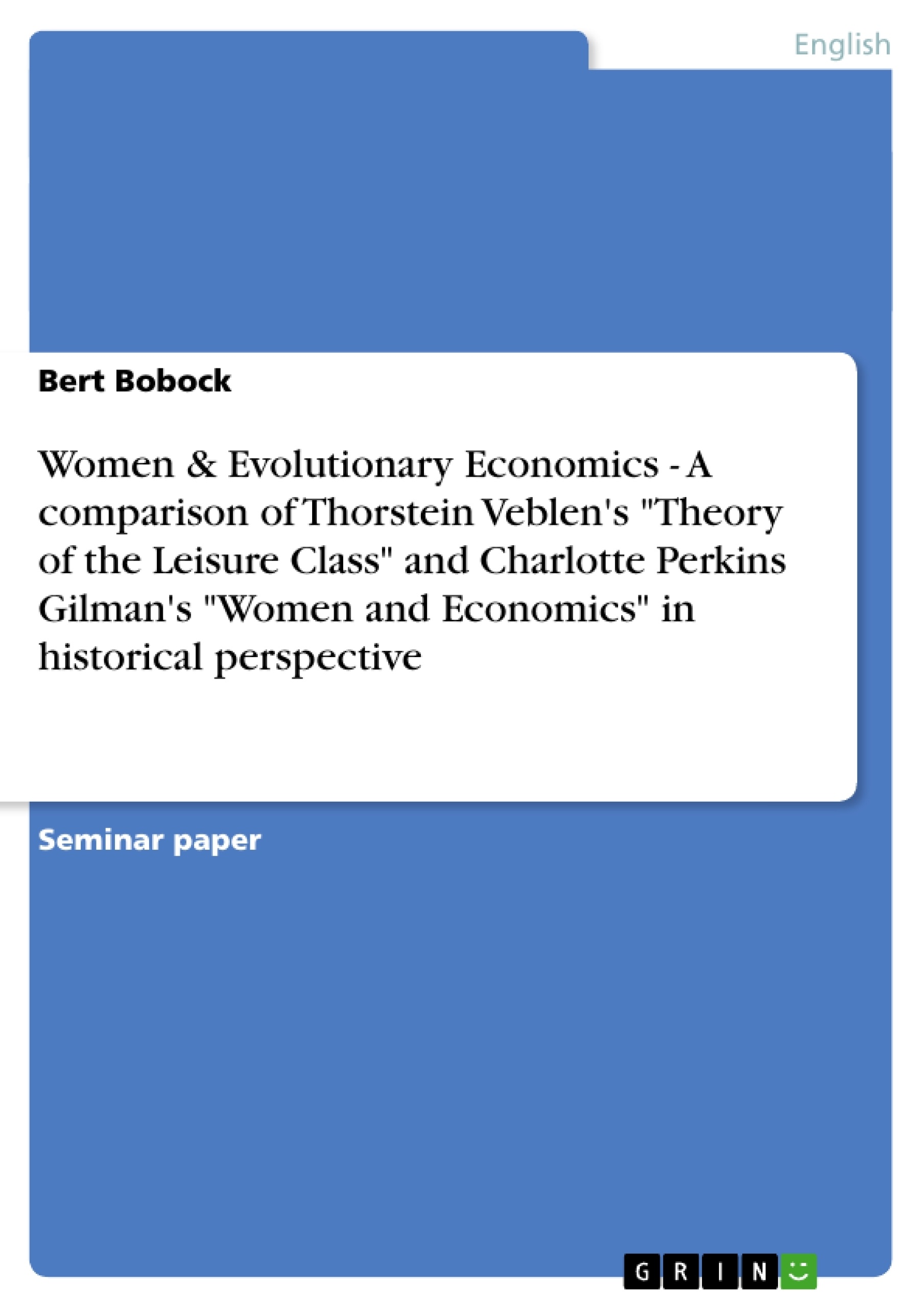This essay seeks to draw a comparison between Thorstein Veblen’s and Charlotte Perkins Gilman’s most
respective books “The Theory of the Leisure Class” and “Women and Economics.”
The purpose of this essay is to show how Veblen’s basic theory of the Leisure Class relates to Gilman’s notion of power relations between the sexes in the 19th century.
Taking a closer look on the economic situation of women in the 19th century, we find them to be the main consumer of economic goods and actively participating in what Veblen calls wasteful consumption. Although many aspects of their criticism are no longer valid, the question raised by Veblen and Gilman concerning economic independence and equality between the sexes remains pertinent today.
Inhaltsverzeichnis (Table of Contents)
- I Introduction - Why and Wherefore
- II Methodological Reflection
- III Common Denominators between Veblen and Gilman
- III 1 Adaptation and Reception Processes
- III 2 Seeking Roots of Gender and Class Discrimination
- III 2.1 Male Canons of Taste - Structural Repression
- III 2.2 Fashion as Social Marker and Discriminatory Factor
- III 3 Reproduction Processes of Discrimination
- IV Conclusion
Zielsetzung und Themenschwerpunkte (Objectives and Key Themes)
This essay aims to compare Thorstein Veblen's The Theory of the Leisure Class and Charlotte Perkins Gilman's Women and Economics, highlighting the connection between class and gender relations and the oppressive systems they create. It explores how Veblen's insights from anthropological and economic research can be used to support, extend, and even challenge Gilman's theory of the unhealthy relationship between the sexes.
- The impact of Edward Bellamy's utopian novel Looking Backward on 19th-century thought, particularly on Gilman and Veblen.
- The connection between social and biological phenomena, contrasting the views of Gilman and Veblen with Social Darwinism.
- The role of adaptation and historical processes in shaping social institutions, cultural habits, and gender and class relations.
- The dangers of using terms like "Natural Law" and "Survival of the Fittest" to justify social stratification and imperialism.
- The concept of civilization as a Eurocentric construct and its potential exclusion of other cultures and races.
Zusammenfassung der Kapitel (Chapter Summaries)
The introduction explores the influence of Edward Bellamy's Looking Backward on thinkers like Gilman and Veblen, focusing on its vision of a future without inequality and its analysis of the root causes of societal injustice in the 19th century. The essay then presents a comparison between Veblen's The Theory of the Leisure Class and Gilman's Women and Economics, arguing that these works, written within three years of each other, offer valuable insights into the emergence of oppressive class and gender relations.
The methodological reflection section delves into the broader intellectual context of the time, highlighting the influence of Darwin's evolutionary theories and the subsequent rise of Social Darwinism. The essay then discusses how both Gilman and Veblen, while drawing inspiration from biological and anthropological phenomena, rejected the notion that social inequalities are inherently biological. It emphasizes the importance of understanding how historical processes and adaptations have shaped social institutions and cultural practices, highlighting the dangers of using biological determinism to justify social stratification and imperialism.
Schlüsselwörter (Keywords)
This essay focuses on key themes of class and gender relations, oppressive systems, social Darwinism, adaptation, historical processes, cultural habits, and imperialism. The authors discussed are Thorstein Veblen, Charlotte Perkins Gilman, and Edward Bellamy, with references to works like The Theory of the Leisure Class, Women and Economics, and Looking Backward. The essay aims to provide a comprehensive understanding of how these concepts intertwine to shape social structures and dynamics in the 19th century.
Frequently Asked Questions
What is the main comparison in this essay?
The essay compares Thorstein Veblen's "Theory of the Leisure Class" and Charlotte Perkins Gilman's "Women and Economics."
How does Veblen define "wasteful consumption"?
Veblen uses this term to describe consumption intended to demonstrate social status rather than fulfill functional needs, often involving the "Leisure Class."
What was Charlotte Perkins Gilman's view on gender relations?
Gilman argued that the economic dependence of women on men led to unhealthy power relations and hindered social progress.
What influence did Edward Bellamy have on these authors?
His utopian novel "Looking Backward" inspired both Veblen and Gilman with its vision of a society without inequality or social injustice.
Did Veblen and Gilman support Social Darwinism?
No, while they used evolutionary concepts, they rejected the idea that social inequalities were biologically inherent or justified by "survival of the fittest."
- Quote paper
- Bert Bobock (Author), 2004, Women & Evolutionary Economics - A comparison of Thorstein Veblen's "Theory of the Leisure Class" and Charlotte Perkins Gilman's "Women and Economics" in historical perspective, Munich, GRIN Verlag, https://www.grin.com/document/93231



